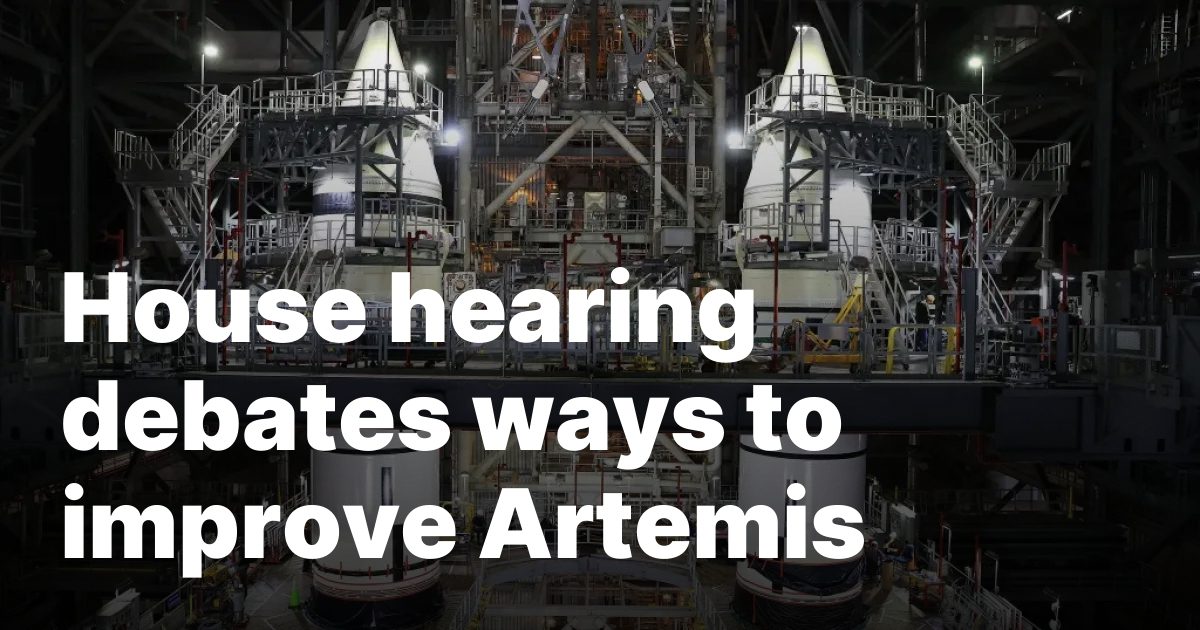
HOUSTON — A recent House committee hearing highlighted differing views from two former government officials on the future of NASA’s Artemis lunar exploration initiative. Both agreed, however, that returning to the moon is essential for moving forward with human missions to Mars.
During the Feb. 26 session of the House Science Committee’s space subcommittee, Scott Pace, the former executive secretary of the National Space Council, proposed an early transition away from dependence on the Space Launch System (SLS). In contrast, Dan Dumbacher, former deputy associate administrator for exploration at NASA, expressed skepticism about SpaceX’s Starship landing astronauts on the lunar surface by the decade’s end.
Pace emphasized that for the U.S. to maintain its leadership in space exploration, human missions must be sustainable and regularly undertaken. “Continuous presence is key, rather than a one-off mission,” he stated in his opening remarks, advocating for reusable components and the utilization of in-space resources.
He expressed significant concern over the SLS, labeling it a “primary issue” for NASA’s Artemis framework due to its high costs and lack of reusability. “It’s time to explore alternatives for transporting astronauts to and from the moon,” he suggested, mentioning the potential of purchasing heavy-lift launch services.
In his testimony, Pace pushed for an urgent reevaluation of reliance on the SLS. He urged that “a revised Artemis campaign plan should be prioritized by the new administrator,” acknowledging the potential need for difficult negotiations with industry and international partners. “Addressing these challenges now is preferable than pursuing an unaffordable and unsustainable path,” he added.
Conversely, Dumbacher raised concerns about the reliance on Starship for the early Artemis missions. He pointed out that NASA’s framework for returning humans to the moon necessitates around 35 to 40 Starship launches to validate capabilities via uncrewed missions before the first crewed Artemis 3 mission. This process includes numerous tanker launches to supply propellant to the Starship lander in low Earth orbit, although the exact count of required tanker flights remains debated.
“Can 40 launches, along with the development of an untested on-orbit fuel station and the integration of numerous operational systems, realistically be completed by 2030?” he inquired. “The likelihood of success for this strategy seems highly uncertain.”
This timeline is particularly relevant as China has announced ambitions to land astronauts on the moon before 2030. “China has consistently met its space milestones within a year of projections,” he noted.
Dumbacher proposed that NASA consider the rapid development of a “small, new lander” that could feasibly reach the moon ahead of 2030. “I envision a simplified lander requiring fewer launches,” he said, although he did not elaborate on its design or development costs.
While Pace did not advocate for an immediate halt to SLS, noting that the Artemis 2 and 3 cores are already well into construction, he mentioned that altering the course now could lead to delays stretching beyond 2030. By Artemis 4, however, he sees potential for more sustainable lunar presence through alternative technologies.
Both Dumbacher and Pace reinforced the idea that returning humans to the moon is a crucial step toward future Mars missions, particularly in light of SpaceX CEO Elon Musk’s ambition to hasten crewed Mars expeditions.
“Though individuals may have varying opinions on space exploration strategies, the national interest is paramount. This approach not only enhances America’s standing but also aligns with the sequential steps outlined by Congress,” Pace asserted.
“We must do this in the correct order: lunar missions first, then Mars,” Dumbacher affirmed.
Key committee members echoed support for lunar exploration, often referencing geopolitical competition with China. “We are engaged in a race to the moon, and it’s imperative that America emerges victorious,” stated Rep. Mike Haridopolos (R-Fla.), chair of the space subcommittee.
Rep. Valerie Foushee (D-N.C.), the subcommittee’s ranking member, also mentioned this competitive landscape, cautioning about disruptions resulting from actions taken by the new Trump administration. “I cannot overlook how the chaos and uncertainty brought on by the Trump administration could jeopardize our efforts to return American astronauts to the moon before China does,” she remarked.
Foushee noted that Dumbacher and Pace were the only witnesses at the hearing, and she expressed her disappointment that NASA declined the invitation to participate. “Full transparency with Congress and the American public regarding such critical efforts like Artemis is essential,” she concluded.
Related









